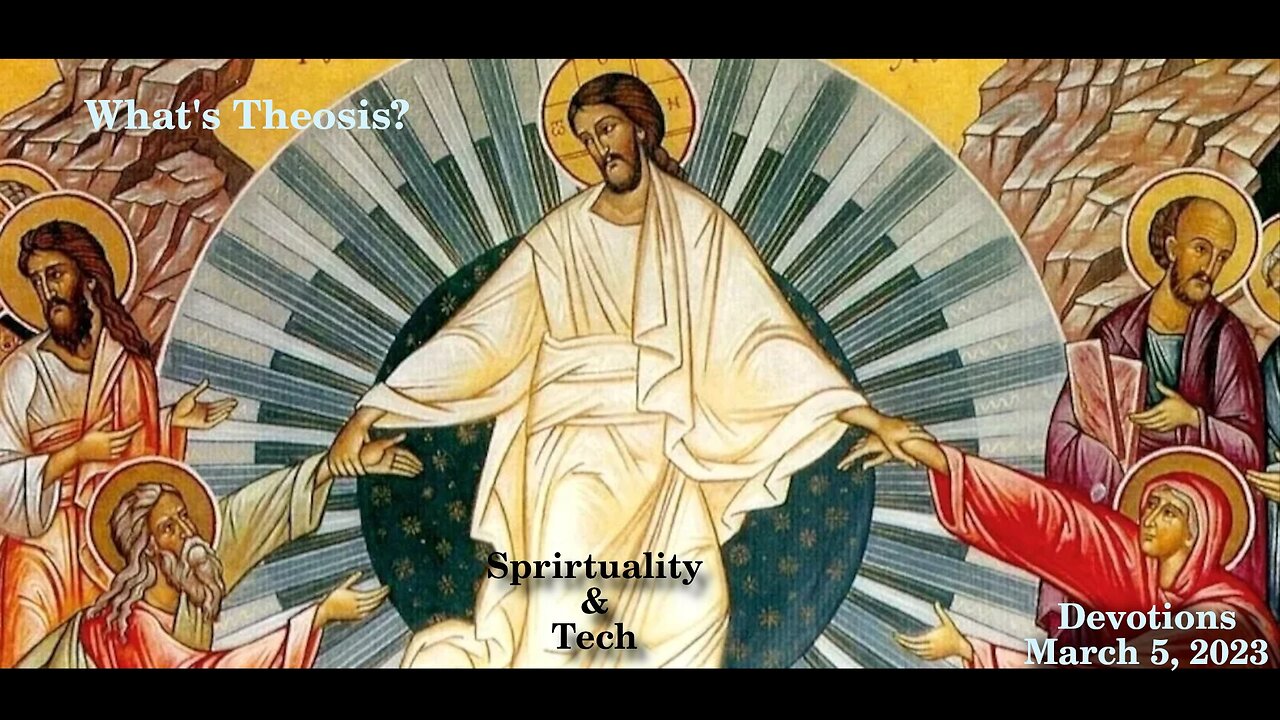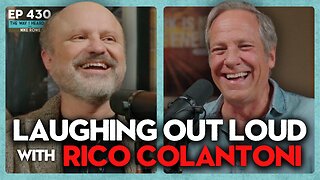Premium Only Content

What's Theosis? Week 1
Father,
As we look at this topic that has been hushed up in Western Christianity for so long due to misunderstanding, I ask that you would send the Holy Spirit to enlighten our minds and hearts to grasp, or at least begin to grasp the truth of it. Help us to break through the molds of Western Christendom that have taught us that we are less than, or far away and need the Church to help us get closer to God. Help us to see that there really is not much difference between theosis and sanctification, other than language. Let the Spirit in which you prayed in John 17 permeate these brief thoughts. Thank you, Lord. In Jesus’ name,
Amen.
What is theosis? Simply put, it is the ultimate goal or telos of salvation in Orthodox Christian traditions. What is it, though? It is the belief that Jesus came to earth as a man, so that by believing in Him, we humans might become one with Him.
What is sanctification, then? The process of walking out our salvation, with the help of the Holy Spirit, until we become “perfect as our Heavenly Father is perfect”. It is the process of becoming holy so that we are fit for heaven when we die.
Do you see the difference in language? In stance? In Orthodox belief, original sin is not a reality. Was there a fall? Yes. Do they tend to see it as having or being a norming norm for humanity, in the way that many protestants, at least, see the doctrine of total depravity? No. Gregory of Palamas, whom we will look at over a couple of memesplanations in the coming week, believed that human passions were actually not native to us. He believed that they were things which were actually counter to our nature. The process of becoming holy (whether you term it sanctification, theosis, or divinization doesn’t matter much) is the process by which we grow closer to God, toward the end of becoming one with Him in heaven. Does this mean that we lose our individuality? No. It means that we gain communion with Him, for eternity. We get all of God, for eternity, and God gets all of us, His whole image, reunited. The way I see it, heaven is unity with God.
What is this based on? There are several prooftexts, and a long tradition of thought about it among the Orthodox Churches. Ever wonder what the image of God is? Ever wonder why there is such an emphasis on unity in the New Testament, in particular? Theosis can explain some of that. The unity in question for the New Testament writers is not a top-down thing, but rather it is a Spirit-up kind of thing. The Holy Spirit comes and knits us together, and we grow in unity and love among ourselves as we grow closer to God. That is the unity I am talking about, mutually self-sacrificial love. That is what is supposed to characterize the Jesus Community, not infighting, empire building, or sniping at one another for doctrinal misunderstandings. I digress.
So what is theosis, then? It is the process of walking out your justification, of, “Working out (y)our salvation with fear and trembling”. That is not a favorite scripture for many of us, I’d wager. That is not fluffy bunnies and rainbows, that is the meat of the Word, boys and girls.
So what is sanctification, then? It is the process, aided by the Holy Spirit, of doing good works in response to the Love that we have received. I think that is more or less how most Western Christians would probably define that term, in a rough sense. It is the Holy Spirit working in and through us to realize the justification we received at the foot of the cross when we surrendered our lives to Jesus and made Him our Lord and Savior.
How different are these terms, really? In practice, not very, in end goal, particularly in terms of linguistics, worlds apart. I touched on that earlier. In the West, we are nothing but poor, miserable sinners, saved by grace. That, while saying that we still in some small, corrupted way, carry the image of God in us. This line of thinking puts a great chasm between us and God, which only the cross can span. Most of the West would agree with these metaphors.
In the East, man is still basically good to start with, but in need of a doctor and a hospital to heal and restore him, not a judge in a courtroom to merely declare him righteous. In the East, the cross does pave the way, but to wholeness and Communion, not to penal justice and rule keeping, to “stay within the boundaries set by the law”. In the East, we can be restored to full Communion, and that is the expected end of the Christian life. In the West, we simply “go to heaven when we die”. Personally, the Eastern concepts speak far more to me.
I want you to really consider these things, as we walk through the next month of teachings on this, both in devotions and in soundbite form in the memesplanations during the week. Part of what I want to do in this study is to show that although we have come to use different terminology, the ends truly are the same. I want to show that we are not as different as we have come to see ourselves as being. I hope to stoke your sanctified imagination with new metaphors and understandings as we go. Next week, I will show you some of the Old Testament texts used to support theosis, as an echo of some of my memesplanations this week, then the following week, we will dive into the New Testament to see what is there. After that, we will wrap it up with a nice little bow at the end of the month.
-
 49:01
49:01
Standpoint with Gabe Groisman
1 day agoHigh Fashion Canceled Her for Working for Trump
3.82K2 -
 36:24
36:24
The Brett Cooper Show
1 day ago $13.68 earnedSnow White. What Happened? | Episode 18
94.4K71 -
 1:19:17
1:19:17
Mike Rowe
1 day agoA Fun Hang With My Very Famous Friend | Enrico Colantoni #430 | The Way I Heard It
19.4K7 -
 1:24:30
1:24:30
Tucker Carlson
15 hours agoDr. Mary Talley Bowden: How Vaccines Got Politicized and the Medical Industry Lost All Credibility
95.9K185 -
 2:35:09
2:35:09
FreshandFit
5 hours agoAfter Hours w/ Hoe Math
61.6K65 -
 1:42:29
1:42:29
Badlands Media
1 day agoDevolution Power Hour Ep. 342: Trump’s Legal Maze, Biden’s Breakdown & the Weaponization of Everything
87.1K38 -
 53:12
53:12
Adam Carolla
8 hours ago $8.74 earnedHealth Insurance Executive sues John Oliver for destroyed reputation + Remembering Val Kilmer #news
55.1K3 -
 3:08:35
3:08:35
TimcastIRL
8 hours agoTrump Signs GLOBAL Tariffs, Trade War Goes NUCLEAR As Market TANKS w/Mark Mitchell | Timcast IRL
233K96 -
 LIVE
LIVE
Akademiks
6 hours agoDay 1/30 Kanye West Interview Part 2 OTW. Young Thug Probation REVOKED? Lil Baby Putting Hits on Ppl
2,629 watching -
 1:10:48
1:10:48
Man in America
12 hours agoPam Bondi Wants the DEATH PENALTY—But Was Mangione FRAMED? The Evidence Will SHOCK You
61.9K30